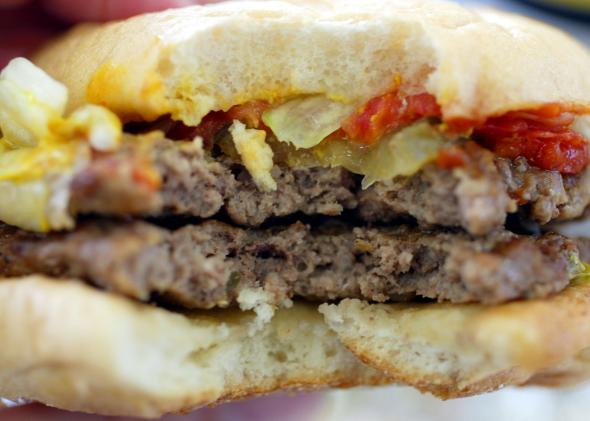Science Teacher Loses 37 Pounds Eating Nothing But McDonald’s, Sets Terrible Example for Students

Photo by Joe Raedle/Getty Images
It’s tempting to simply ignore morning shows, which so often peddle feel-good stories while paying no mind to the world's pressing problems. But sometimes a segment comes along that so perfectly encapsulates the perversity of modern American life that it basically demands analysis. This morning, the Today Show produced one of those segments, interviewing a middle-aged high school teacher named John Cisna who lost 37 pounds and lowered his cholesterol by eating 2,000 calories’ worth of McDonald’s food every day for 90 days.
Visit NBCNews.com for breaking news, world news, and news about the economy
Cisna enlisted his students as nutritionists, turning his weight-loss plan into a school project by having a few of his kids plan his daily menus. He also began walking 45 minutes each day, a change from his usual sedentary lifestyle. He got all his food free from his local McDonald’s, whose manager surely predicted that the good publicity would make up for the tiny amount of lost inventory.
I suspect that the response from the medical establishment will be that Cisna is setting a bad example for people who want to lose weight, since most of McDonald’s menu isn’t nutritionally ideal, and since eating every meal at McDonald’s is not a sustainable (or affordable) regime for most people. But I’m more concerned about the example Cisna is setting for his students.
If John Cisna wants to try to lose weight by eating at McDonald’s every day, fine—but it’s his responsibility to monitor his diet, not his students’. And teachers should be particularly careful about talking about dieting in the classroom given teens’ susceptibility to eating disorders and negative body image. Add in the pro-business political implications of Cisna’s project—“Hey, it’s choice. We all have choices; it’s our choices that make us fat, not McDonald’s,” he told a local news station—and you have what looks like the dissolution of appropriate student-teacher boundaries.
What’s worse is that Cisna’s not even teaching his kids good science. “Math tells you, if you only eat 2,000 calories a day, your body has to use more calories than that just to operate,” he told Matt Lauer and Savannah Guthrie. This “calories in, calories out” equation doesn’t tell the whole story. The composition of your diet affects your metabolism, and your metabolism slows when you lose weight. Unsurprisingly, the effect of weight loss on metabolism means that most people who lose weight gain it back—study after study has shown that most people can lose lots of weight in the short term, but few people can keep it off. (By the time Cisna gains back his lost weight, the Today Show will have moved on to another incredible, feel-good weight-loss story—perhaps someone will lose 40 pounds eating only submarine sandwiches or pizza. Oh, wait.)
What’s more, there’s not even strong evidence that losing weight is good for you. A meta-study published last month indicated that weight loss is not correlated with improvements in cholesterol, blood pressure, and blood sugar levels. What has been shown to improve these metrics? Exercise. The majority of Cisna’s cholesterol improvement was probably a result of his new daily walking routine, not the McDonald’s diet. But the truism that exercise improves health is far too boring to attract the attention of morning-show producers.
